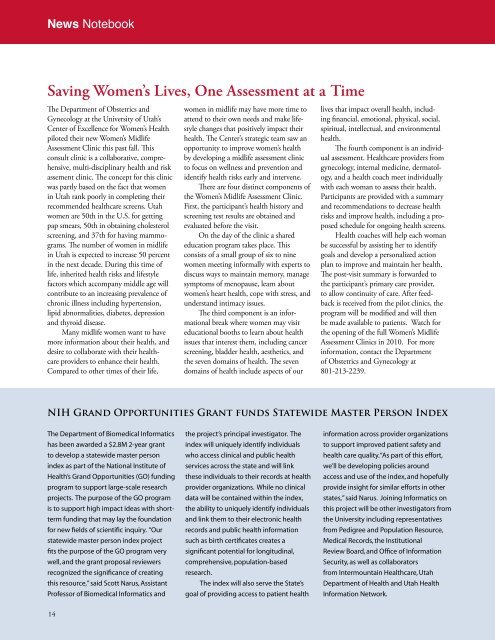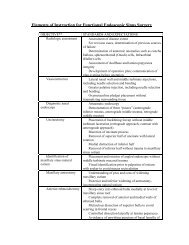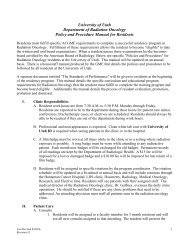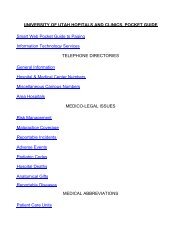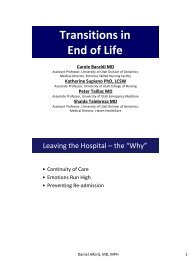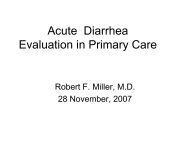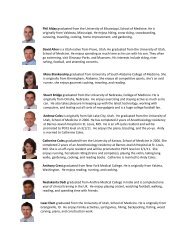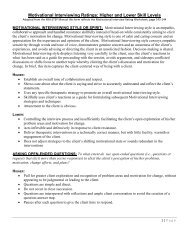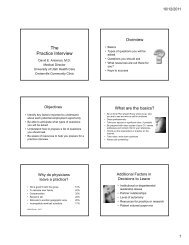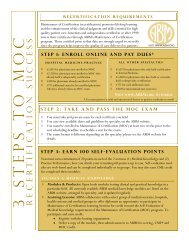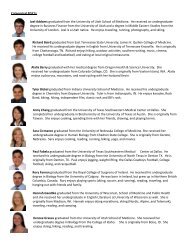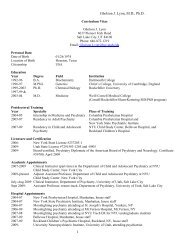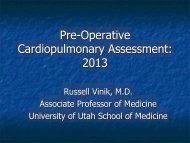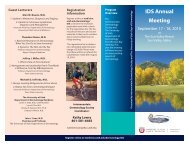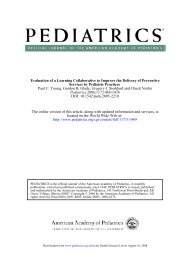Winter 2010 - University of Utah - School of Medicine
Winter 2010 - University of Utah - School of Medicine
Winter 2010 - University of Utah - School of Medicine
You also want an ePaper? Increase the reach of your titles
YUMPU automatically turns print PDFs into web optimized ePapers that Google loves.
News Notebook<br />
Saving Women’s Lives, One Assessment at a Time<br />
The Department <strong>of</strong> Obstetrics and<br />
Gynecology at the <strong>University</strong> <strong>of</strong> <strong>Utah</strong>’s<br />
Center <strong>of</strong> Excellence for Women’s Health<br />
piloted their new Women’s Midlife<br />
Assessment Clinic this past fall. This<br />
consult clinic is a collaborative, comprehensive,<br />
multi-disciplinary health and risk<br />
assement clinic. The concept for this clinic<br />
was partly based on the fact that women<br />
in <strong>Utah</strong> rank poorly in completing their<br />
recommended healthcare screens. <strong>Utah</strong><br />
women are 50th in the U.S. for getting<br />
pap smears, 50th in obtaining cholesterol<br />
screening, and 37th for having mammograms.<br />
The number <strong>of</strong> women in midlife<br />
in <strong>Utah</strong> is expected to increase 50 percent<br />
in the next decade. During this time <strong>of</strong><br />
life, inherited health risks and lifestyle<br />
factors which accompany middle age will<br />
contribute to an increasing prevalence <strong>of</strong><br />
chronic illness including hypertension,<br />
lipid abnormalities, diabetes, depression<br />
and thyroid disease.<br />
Many midlife women want to have<br />
more information about their health, and<br />
desire to collaborate with their healthcare<br />
providers to enhance their health.<br />
Compared to other times <strong>of</strong> their life,<br />
women in midlife may have more time to<br />
attend to their own needs and make lifestyle<br />
changes that positively impact their<br />
health. The Center’s strategic team saw an<br />
opportunity to improve women’s health<br />
by developing a midlife assessment clinic<br />
to focus on wellness and prevention and<br />
identify health risks early and intervene.<br />
There are four distinct components <strong>of</strong><br />
the Women’s Midlife Assessment Clinic.<br />
First, the participant’s health history and<br />
screening test results are obtained and<br />
evaluated before the visit.<br />
On the day <strong>of</strong> the clinic a shared<br />
education program takes place. This<br />
consists <strong>of</strong> a small group <strong>of</strong> six to nine<br />
women meeting informally with experts to<br />
discuss ways to maintain memory, manage<br />
symptoms <strong>of</strong> menopause, learn about<br />
women’s heart health, cope with stress, and<br />
understand intimacy issues.<br />
The third component is an informational<br />
break where women may visit<br />
educational booths to learn about health<br />
issues that interest them, including cancer<br />
screening, bladder health, aesthetics, and<br />
the seven domains <strong>of</strong> health. The seven<br />
domains <strong>of</strong> health include aspects <strong>of</strong> our<br />
lives that impact overall health, including<br />
financial, emotional, physical, social,<br />
spiritual, intellectual, and environmental<br />
health.<br />
The fourth component is an individual<br />
assessment. Healthcare providers from<br />
gynecology, internal medicine, dermatology,<br />
and a health coach meet individually<br />
with each woman to assess their health.<br />
Participants are provided with a summary<br />
and recommendations to decrease health<br />
risks and improve health, including a proposed<br />
schedule for ongoing health screens.<br />
Health coaches will help each woman<br />
be successful by assisting her to identify<br />
goals and develop a personalized action<br />
plan to improve and maintain her health.<br />
The post-visit summary is forwarded to<br />
the participant’s primary care provider,<br />
to allow continuity <strong>of</strong> care. After feedback<br />
is received from the pilot clinics, the<br />
program will be modified and will then<br />
be made available to patients. Watch for<br />
the opening <strong>of</strong> the full Women’s Midlife<br />
Assessment Clinics in <strong>2010</strong>. For more<br />
information, contact the Department<br />
<strong>of</strong> Obstetrics and Gynecology at<br />
801-213-2239.<br />
NIH Grand Opportunities Grant funds Statewide Master Person Index<br />
The Department <strong>of</strong> Biomedical Informatics<br />
has been awarded a $2.8M 2-year grant<br />
to develop a statewide master person<br />
index as part <strong>of</strong> the National Institute <strong>of</strong><br />
Health’s Grand Opportunities (GO) funding<br />
program to support large-scale research<br />
projects. The purpose <strong>of</strong> the GO program<br />
is to support high impact ideas with shortterm<br />
funding that may lay the foundation<br />
for new fields <strong>of</strong> scientific inquiry. “Our<br />
statewide master person index project<br />
fits the purpose <strong>of</strong> the GO program very<br />
well, and the grant proposal reviewers<br />
recognized the significance <strong>of</strong> creating<br />
this resource,” said Scott Narus, Assistant<br />
Pr<strong>of</strong>essor <strong>of</strong> Biomedical Informatics and<br />
14<br />
the project’s principal investigator. The<br />
index will uniquely identify individuals<br />
who access clinical and public health<br />
services across the state and will link<br />
these individuals to their records at health<br />
provider organizations. While no clinical<br />
data will be contained within the index,<br />
the ability to uniquely identify individuals<br />
and link them to their electronic health<br />
records and public health information<br />
such as birth certificates creates a<br />
significant potential for longitudinal,<br />
comprehensive, population-based<br />
research.<br />
The index will also serve the State’s<br />
goal <strong>of</strong> providing access to patient health<br />
information across provider organizations<br />
to support improved patient safety and<br />
health care quality. “As part <strong>of</strong> this effort,<br />
we’ll be developing policies around<br />
access and use <strong>of</strong> the index, and hopefully<br />
provide insight for similar efforts in other<br />
states,” said Narus. Joining Informatics on<br />
this project will be other investigators from<br />
the <strong>University</strong> including representatives<br />
from Pedigree and Population Resource,<br />
Medical Records, the Institutional<br />
Review Board, and Office <strong>of</strong> Information<br />
Security, as well as collaborators<br />
from Intermountain Healthcare, <strong>Utah</strong><br />
Department <strong>of</strong> Health and <strong>Utah</strong> Health<br />
Information Network.


